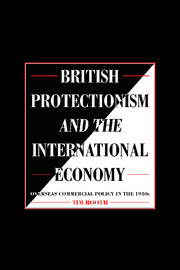Book contents
- Frontmatter
- Contents
- Preface
- List of Tables
- Introduction
- 1 Britain's international economic position in the 1920s
- 2 The political economy of protectionism
- 3 Imperial preference and the Ottawa Conference
- 4 The Scandinavian negotiations: formulation of policy
- 5 Completion of the first phase of negotiations: Scandinavia, Germany and Argentina
- 6 The world economic conference, Finland and Japanese competition
- 7 The Baltic states and Poland
- 8 British agricultural policy and imports during the 1930s
- 9 British exports to the trade agreement countries
- 10 Appeasing Germany and the United States
- 11 Some general conclusions
- Appendix A United Kingdom: payments, clearing etc., Agreements in force 1931–1938
- Appendix B Miscellaneous trade and payments agreements
- Appendix C Imports into Britain from foreign agreement countries
- Appendix D Total exports from Britain to foreign agreement countries and four dominions
- Appendix E Imports of selected commodities into UK, 1931, 1937, showing percentage from Empire sources
- Bibliography
- Index
- Frontmatter
- Contents
- Preface
- List of Tables
- Introduction
- 1 Britain's international economic position in the 1920s
- 2 The political economy of protectionism
- 3 Imperial preference and the Ottawa Conference
- 4 The Scandinavian negotiations: formulation of policy
- 5 Completion of the first phase of negotiations: Scandinavia, Germany and Argentina
- 6 The world economic conference, Finland and Japanese competition
- 7 The Baltic states and Poland
- 8 British agricultural policy and imports during the 1930s
- 9 British exports to the trade agreement countries
- 10 Appeasing Germany and the United States
- 11 Some general conclusions
- Appendix A United Kingdom: payments, clearing etc., Agreements in force 1931–1938
- Appendix B Miscellaneous trade and payments agreements
- Appendix C Imports into Britain from foreign agreement countries
- Appendix D Total exports from Britain to foreign agreement countries and four dominions
- Appendix E Imports of selected commodities into UK, 1931, 1937, showing percentage from Empire sources
- Bibliography
- Index
Summary
On 21 September 1931 the United Kingdom abandoned the gold standard. On 1 March 1932 when the Import Duties Act came into effect, Britain had finally adopted full protection. Thus within less than six months two of the great symbols of Britain's leadership of the nineteenth-century international economy, the gold standard and free trade, had gone. Moreover, the Import Duties Act signified more than simple protection. By temporarily exempting Empire products from the new duties, and by including a bargaining clause, the construction of regional or imperial trading blocs was envisaged.
This accords with a view of how a once dominant economic power behaves in retreat. Robert Gilpin writes of Great Britain
As the periphery advances, as it frees itself from dependence on the core and the terms of investment shift to its advantage, the core retreats into protectionism or some form of preference system. It throws up barriers both to the export of capital and to the import of foreign goods. It favors preferential commercial arrangements.
Robert Skidelsky argues of the emerging economic pluralism before the First World War that the spread of industrialisation created a paradox because it increased global interdependence at the same time as new democratic and nationalist forces were displaying growing intolerance of the Pax Britannica.
- Type
- Chapter
- Information
- British Protectionism and the International EconomyOverseas Commercial Policy in the 1930s, pp. 1 - 8Publisher: Cambridge University PressPrint publication year: 1993



